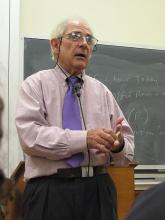Social Reality12
Jul 29, 2010Our topic this week is social realities. I must admit that when I first brought the nature of social reality up as a topic for an episode of Philosophy Talk, the non-philosophers on our team all went “huh?” That phrase obviously doesn’t mean much to the person on the street. But social realities are all around us. Think of cocktail parties, football games, bar mitzvahs, political rallies, and even nations. These are all social realities.

Comments (1)
Harold G. Neuman
Saturday, March 12, 2022 -- 8:06 AM
In researching the subjectIn researching the subject (reality) and the shows devoted to it, it was found that reality exists in many forms. As that is the case, it is a fertile topic. I have some familiarity with Searle and his work. And a hint of the levels-of-reality also mentioned in the blog archive. I have heard Searle both praised and reviled., Am not really interested in either stance or reasons there for. He systematized social foundations for one sort of reality, and wrote and lectured about his findings and theses. Nothing wrong with that. Someone else could have done as well.
So, reality is much like truth. It may be self-evident; found or made. Whether the found and/or made varieties are useful depends on who believes them; whether there are stakeholders; and, moreover, whether there are large sums of money involved. All of these criteria need not be met, but it sure does help. Religious beliefs and political ideologies are, generally, found or made. Some may claim that democracy is a 'natural' state, but any belief about it is ultimately based on freedom and self-determination---I submit these were found and/or made; never were they self-evident. And, whichever the case, those who claim self-evidence, probably had vested interests, a priori. I have asserted something I call contextual reality. This accounts for, encompasses most of Searles' designations. It also takes into consideration mass and popular culture and the oppressive pandemia of extremism, under which some feel compelled to risk life and limb, in order to gain group acceptance (no fear!). Contextual reality is, I claim, forever changing and eminently changeable.
I also think, though have no means of proof, that John Searles' ideas stoked admirers and detractors alike, and that he knew, at least intuitively that they would do so.. His admirers were agents-of-change themselves, believing we should know all we could know about societal change---how and why it happens. The detractors, status quo seekers, feared social change and upheaval, knowing further that such forces could be unpredictable and disruptive. It was not the first time a philosopher had scared people.
Well. You may believe as you will. We are in the age of contextual reality. Postmodernism is one outcome of that diaspora. Extremist views and recklessness are others. Thanks.